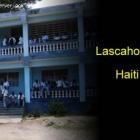ADVERTISEMENT
Germany - Haiti Observer Blog
Germany, Haiti Observer Blog. Read the following articles about Germany
Haiti's First Big Organic Banana Crop Enters Euro zone
The first crop of organic bananas has been harvested, and is on its way to Europe and parts of the Caribbean. A German cargo ship docked at the coastal city of Cap Haitien to pick up and transport 100 tons of organic bananas. Before the ship left Haiti, German quality assurance professionals examined the load of 8,000 bunches of bananas.
AGRITRANS, part of an agriculture association, is elated it has met the challenge to permit it to export organic bananas to the Euro zone market. In two years time, AGRITRANS expects 450 containers of organic bananas to be exported every week to Europe.
Peligre Hydroelectric Plant Restoration
The Péligre Hydroelectric Plant, located in Central Department, supplies Haiti with much of the island's electricity needs. But in the past few decades it has deteriorated, neglected by Électricité d'Haiti, the national provider of energy.
Haitian President Martelly has made improving the energy infrastructure a primary focus of his 5 "E" initiative. Germany has responded to Martelly's call for a reliable energy system, by funding the restoration of the PHP. The goal is to provide Haiti with electricity service 24 hours a day in the not- too-distant future.
In an agreement with Germany, Minister of Economy and Finance, Wilson Laleau, along with German Ambassador, Klaus Shick, served as signatories to a memorandum of understanding for the sum of ten million Euros to restore the PHP. The PHP serves the Péligre Hydroelectric Dam (PHD), situated on the Artibonite River. It was constructed under the Artibonite Valley Agricultural Project during the 1930s, producing the Lake Péligre reservoir. Problems with the PHD have developed over past decades with large amounts of silt deposits increasing at an alarming rate. As a result, the reservoir's energy-producing capacity has declined. The cause of the alluvial buildup is deforestation of the island. Only 4%-6% of tree cover remains, when once the entire country was blanketed with forests.
Caribbean leaders to impose sanction on Dominican Republic
The Caribbean community (Caricom) should be commended for taking its first action against a cancer that is growing and spreading in the Dominican Republic. Declaring that it can no longer be business as usual, they suspended the Dominican Republic's application to join its regional economic bloc, following the court decision in Dominican Republic to remove the citizenship of many Dominicans with Haitian background.
The Dominican Republic must really have a huge problem with Black people, Haitians in particular since not only they are black, they are also poor.
After the Haitians, will they ask that only white people comes to visit the country?
Emmanuel "Manno" Sanon, 1974 soccer player, FIFA World Cup in Germany
Emmanuel Sanon, aka Manno, became a top-rated soccer player for Haiti's National Team (HNT). Born in Port-au-Prince in 1951, he was schooled at Lycee de Petion-Ville High School.
Four years after joining HNT in 1970, Manno and his teammates played for the FIFA World Cup in Europe. HNT had fought its way through the qualifying rounds of the World Cup play-offs, and successful, found themselves facing a trio of daunting competitors: Italy, Argentina, and Poland.
HNT lost to all three, yet Manno made a lasting impression on the soccer world. During the game against Italy, Manno surprised everyone by scoring the first goal of the game. What was so incredible about this achievement is Italy goalkeeper, Zoff, had not permitted any opposition players to score a goal in two-plus years.
Brief Political Career of Rosalvo Bobo
Rosalvo Bobo became a Haitian revolutionary and government official as America and Europe entered World War I. Although educated as a physician and attorney, his strong political views and dominant personality led him to seek power in Haitian politics.
In 1914, Haiti had been a free republic for a decade, having won its independence from France. But it had not been successful as a stable government, having witnessed a turnover of three presidents in less than two years.
Near the end of 1914, Rosalvo Bobo led a military invasion on a prison holding detainees, which failed, forcing him to find sanctuary at the German embassy. After five days secreted, Bobo reappeared, announcing he was leading a rebellion to unseat President Oreste Zamor from office. He was successful and Davilmar Theodore came into power. Theodore named Bobo Secretary of State of the Interior and Commander of the Haitian police. However, both Bobo and Theodore's time in power was cut short.
Germany's Betrayal of Haiti
A small colony of Germans colonized St. Domingue, as Haiti was known then, in Bombardopolis. The government of Haiti (GOH) received them warmly, and made them citizens when Haiti won independence from the French. By the 1850s, Germans became permanent residents.
But Germans' motives for settling there spelled trouble for GOH later on. They began meddling in the country's internal affairs, with several failed coup d'etats. As an example of their greed for power, they coerced GOH into paying exorbitant indemnities for a minor incident involving a Haitian-German at the Port-au-Prince dock. Haiti paid quickly to halt threats of violence to Port-au-Prince.
Haitian President Tiresias Simon Sam
Tiresias Simon Sam was born on May 15, 1835, in Grande-Riviere-du-Nord. Tiresias was born with leadership skills and had a lot of passion for his country. Before being a president he served as a general and then a minister of war under Florvil Hyppolite. He was chosen as the acting president after the death of Hyppolite and he was elected as the president of Haiti on March 31, 1896.
Tiresias valued education and always choose educated people in his government. He was determined to make Haiti a better place and for sure Haiti developed greatly during his era. He increased jobs opportunities, improved transport, contracted U.S to build street car in Port -au-Prince and built a railway line to connect Cap Haitian to Grand Riviere du Nord and Port -au-Prince to Cul-de-Sac. Tiresias also built a civil court in Cap-Haitian and updated the school of science, Engineering and architecture.
The Jewish community in Haiti
Haiti became a safe place, and an eventual home, for many of the Jews who fled Europe during the Nazi reign of terror. While other nations turned them away, the Caribbean country, also victims of crimes by the German power, essentially saved the lives of nearly 300 Jews.
Those who hoped to enter the United States were given affidavits, but would have to wait until their numbers were called. Some were able to secure passage to Haiti and traveled there on Visa's to stay until they were able to enter the US.
Given shots and tips on how to survive in the tropics, they eventually learned to settle into Haitian life. Most found themselves entered into the middle class and the children were schooled and quickly learned French. There was a booming community developing among the arriving Jews and they soon became referred to as 'Austrians', as most were discovered to be from Austria.
Germany uses Haiti to Challenge the Monroe Doctrine
Haiti, who had sympathized with France during the Franco-Prussian war in 1870, angered the German community residing there at a time when the bigger country was already smarting from the United States' use of the Monroe Doctrine to thwart their dealings with Venezuela.
Perhaps because of this, Haiti's allegiance to their former colonizers over Germany resulted in a systematic wearing away of the smaller country's dignity by the Europeans. As quickly as was possible, two German warships were deployed to collect debts owed to German merchants. On the command of Captain Batsch these monies were to be collected plus insurances. This move was to demonstrate their power over Haiti and ugly instances of seized Haitian ships, held until the money was paid, being returned with defiled Haitian flags strewn across the deck was a demonstration of the German control. The offending Captain Batsch even returned to gloat months later under the guise of a courtesy visit.
US occupation of Haiti from 1915 to 1934
The US occupation of Haiti from 1915 to 1934 was US response to near-anarchy in Haiti. It was during this period that US took complete control of the nation and ran the economy, installed puppet governments and controlled every aspect of the nation including police and military. Haitians did not like this and neither did US citizens and the US troops that were deployed in Haiti. Eventually, in 1934, United States withdrew its personnel from the Republic of Haiti.
THE PAST
Haiti earned its independence in 1804 from France but the following century was a period of utter chaos and dictatorship. From 1908 to 1915, at least 7 men became President of Haiti but only to meet a gruesome end. During the same century, US was busy expanding its influence in the Caribbean and by 1914, US was actually interfered with Dominica Republic that shared Hispaniola Island with Haiti. It was in 1914 that US opened the Panama Canal that was both militarily and strategically of high strategic value.
Our objective is to share with you news and information about Haiti and the people of Haiti. Traditions, habits and the way we were or grew are alive in this site. We highly recommend that you Subscribe to our Newsletter and also share with us some of the things that are memorable and made us unique people.

 Life After Death
Life After Death  Haiti tech Summit
Haiti tech Summit  Saint Michel de L 'Atalaye
Saint Michel de L 'Atalaye  Lascahobas, Haiti
Lascahobas, Haiti  Haitian Thanksgiving
Haitian Thanksgiving